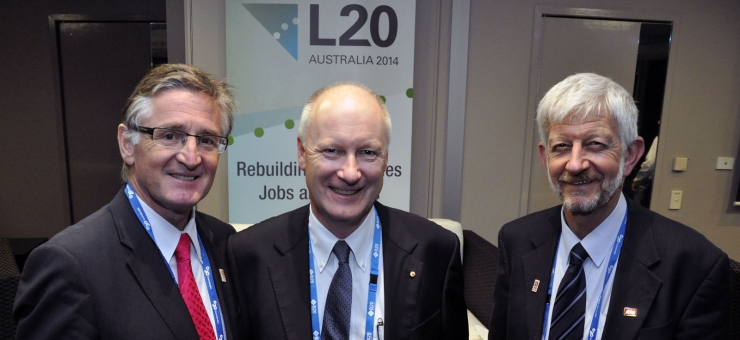News
Labour 20 warn gaps in G20 agenda risk jobs

With more than 200 million people unemployed around the world, massive youth unemployment and stagnant wage growth, projections that the global economy will meet a 2 per cent target above current trajectories are based on unrealistic economic modelling.
The modelling adopted by the G20 leaders assumes full employment, which is clearly not the case in most of the world, said Sharan Burrow, General Secretary of the International Trade Union Confederation.
“We have no confidence that on current economic modelling the 2 per cent growth target can be achieved. With the huge unemployment crisis, and no plans to address demand needed to stimulate the global economy, the G20 will be back next year with higher unemployment and more fractured societies,” Burrow said.
The L20 assessment of the communique shows that inequality and inclusive growth were left aside in favour of business interests being put ahead of those of working people.
“Positive steps have been made by the G20 on tax evasion and avoidance through the BEPS Action Plan, investment in infrastructure and participation of women in the workforce, but much greater action is needed on shadow banking regulation, public disclosure of tax reporting and responsible investments to reduce risk and put the real economy back on track,”’ said John Evans, General Secretary of the Trade Union Advisory Committee to the OECD (TUAC).
“We thank the international community of governments for overcoming the obstacles put in place by the Australian government to leave action on climate change and social dialogue off the agenda of the G20,” said Burrow.
UNI Global Union General Secretary Philip Jennings said, “We welcome the 2% growth target but there is no commitment to provide its fair distribution. Since the crash and even before, the fruits of growth have always “gushed up” to the wealthiest. I would have preferred a commitment to halt the falling income share in the wealth produced - a 2 % growth in the wage share would put demand back with the economy.”
The L20 welcomed the leaders’ statement on Ebola, which recognised the important role of healthcare and relief workers in combatting the outbreak in Guinea, Liberia and Sierra Leone.
“We look forward to working with the Turkish Presidency of the G20 to re-launch the G20’s work on inequality, climate and raising social standards in global supply chains.
The G20 will have to recognise the importance of the world refugee crisis. We expect social dialogue to be a hallmark of the G20 going forward instead of the narrow corporate interests promoted by the Australian Presidency and we thank the Turkish Government for their support on this question,” said Burrow.
Ged Kearney, President of the Australian Council of Trade Unions, said the Australian Government’s Presidency of the G20 had been a missed opportunity to show global leadership.
“Sadly, the Abbott Government dropped the ball when it had the chance to provide mature leadership to the G20 on climate change and inequality and instead used this forum as a soapbox to advocate domestic policies that are driving down living standards in Australia,” she said.
Philip Jennings said “There was a great contradiction at the G20, as Australia is known as the ‘Fair Go’ country where everyone has the opportunity for decent work and a good standard of living. The Australian Government hosts gagged at any reference to Fair Go, tried to close down debate on social dialogue, wages and social inclusion and were very simple minded and plain silly to try to frustrate the access of unions at the Summit. It was a pity to act in such a small time way on the global stage.

